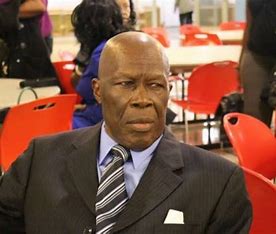For the second time in two days, the Senate has rejected a motion seeking to rename the Independent National Electoral Commission (INEC) headquarters after the late Professor Humphrey Nwosu, the chairman of the defunct National Electoral Commission (NEC), who oversaw the historic June 12, 1993, presidential election.
Earlier on Wednesday, in fierce debate that erupted on the floor of the Senate some lawmakers had blocked a motion seeking to immortalize the late Humphrey Nwosu, the electoral umpire that superintended over the historic June 12, 1993, presidential election.
Not deterred by the rejection Abaribe on Thursday came with a motion on recession, coming under Order 52(C) he represented the Motion.
The motion, re-sponsored by Senator Enyinnaya Abaribe on Thursday, sought posthumous national honours for Nwosu, recognizing his role in Nigeria’s democratic evolution. However, the proposal met stiff resistance, highlighting deep divisions over Nwosu’s legacy and whether his role in the June 12 election merited such an honour.
During the heated deliberations on Thursday, senators took contrasting positions on Nwosu’s place in history. Senator Osita Ngwu defended the former NEC chairman, arguing that Nwosu was operating under a military regime and was constrained in announcing the election results.
“There was no way he would have announced the results with a gun to his head. That doesn’t change the fact that some of us see him as a hero,” Ngwu insisted.
Senator Austin Akobundu also condemned attempts to downplay Nwosu’s contributions, calling it “most uncharitable” to dismiss the man who organized one of Nigeria’s most credible elections.
However, others strongly opposed immortalizing Nwosu. Senator Jimoh Ibrahim dismissed the idea, stating that the former electoral chairman failed in his duty.
“Nothing should be named after him. He did not announce the result, and that singular failure invalidates any honour,” Ibrahim argued.
Senator Cyril Fasuyi echoed similar sentiments, asserting that “history does not reward efforts, but only results. As long as he did not announce the result, whether under duress or not, I am against naming INEC headquarters after him.”
Other lawmakers, like Senator Sunday Karimi, criticized Nwosu for failing to show courage in defending the integrity of the election, while Senator Afolabi Salisu warned that recognizing Nwosu in such a manner could diminish the legacy of MKO Abiola, the presumed winner of the election.
“Any attempt to do anything beyond a one-minute silence is to rubbish Abiola’s legacy,” Salisu declared.
Following the intense debate, the motion was once again put to a voice vote, and the majority of senators rejected it. The Senate, however, agreed to observe a one-minute silence in honour of Nwosu and extend condolences to his family.
Despite the rejection of the motion, the debate reflects an ongoing national conversation on how best to recognize the figures behind the June 12 election. While some believe Nwosu deserves to be honoured for his role, others argue that history should only reward those who saw their duties through to completion.
With the Senate’s refusal to immortalize Nwosu, all eyes now turn to President Bola Ahmed Tinubu, who played a significant role in the June 12 struggle. Whether the executive will heed calls from the Southeast Caucus and other supporters of Nwosu remains to be seen.

Late Humphrey Nwosu
